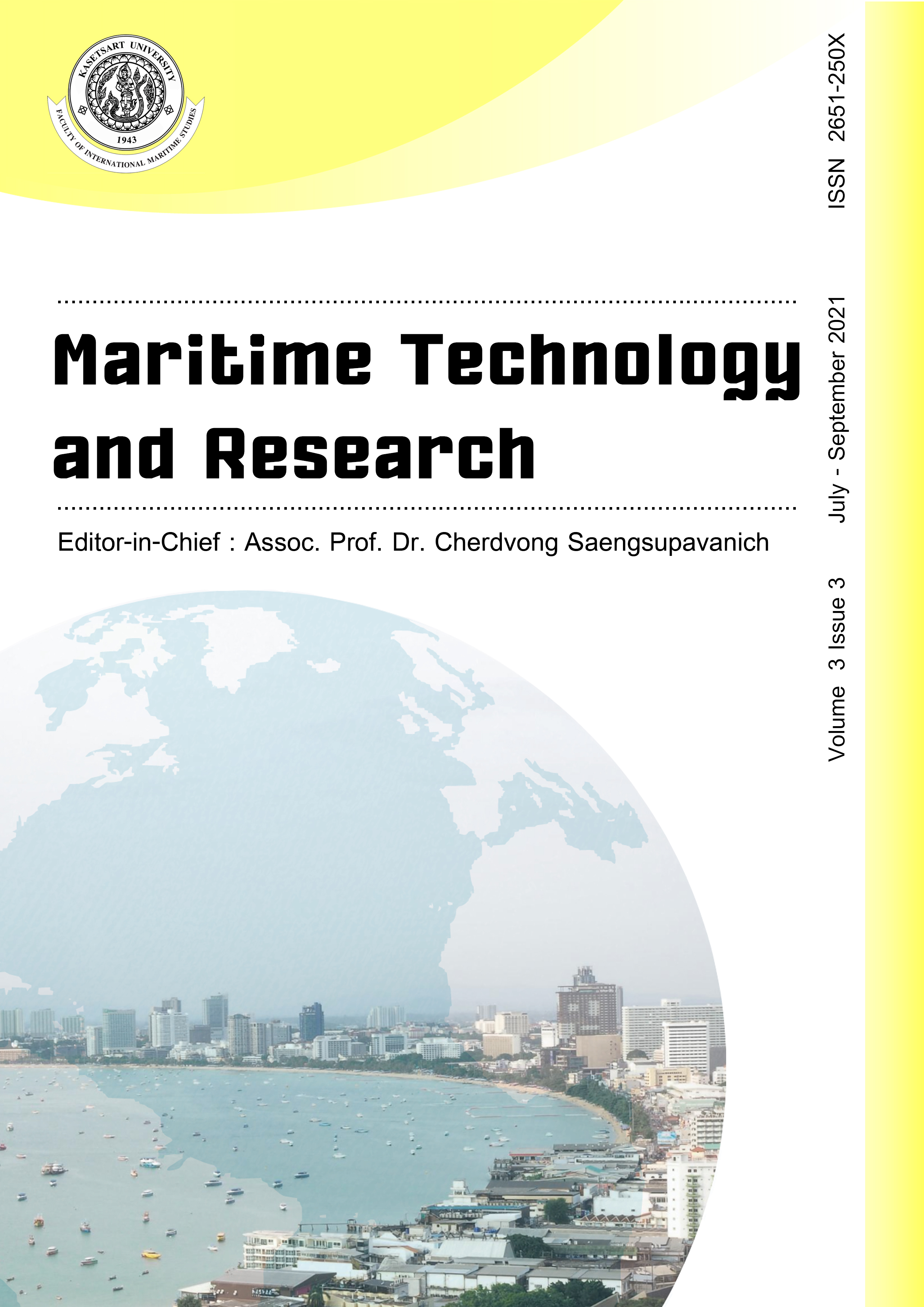The potential of 5G in commercial shipping
DOI:
https://doi.org/10.33175/mtr.2021.248995Keywords:
5G, Automation, Autonomous ships, SMART connectivity, Unmanned vessels, COVID-19Abstract
The buzz about 5G technology has been going on for a few years now. The technology, even before its inception, has had its fair share of controversy, with concerns over its influence on the environment and national security. Recently, some conspiracy theories branded 5G as the primary cause of COVID-19. As the technology develops, one realizes that 5G has many positives and enormous potential in the field of mobile communication. To tap this potential, 5G is being simultaneously developed by many companies globally. Unlike earlier generations of mobile communication, 5G offers numerous benefits when adopted in the maritime domain. Hence, technologically advanced nations are experimenting with the use of 5G in shipping, ports, and shipbuilding. While the understanding of the 5G technology is still at the nascent stage for most of us, this article aims to discuss the potential of 5G in commercial shipping by discussing the pros and cons associated with this technology. The article overall aims to provide a start point for future work and studies on the use of this technology in the maritime industry, and by no means is considered a ‘one-stop’ solution to the problems of commercial shipping.
References
Agarwala, N. (2020). Technology imperatives for emission reduction to address decarbonising in shipping. Institute of Marine Engineers, India.
Agarwala, N. (2021). Role of policy framework in disruptive technologies in the maritime domain. Australian Journal of Maritime & Ocean Affairs. doi:10.1080/18366503.2021.1904602
Buckholm, M. K. (2019). Super radio develops technology that lets boats “talk to each other”: Builds 5G for the world’s first autonomous container ship. Smart Innovation Norway. Retrieved from https://en.smartinnovationnorway.com/news/develops-5g-technology-allows-boats-talk
CB Insights. (2018). Massive cargo ships are going autonomous. Here are the companies & trends driving the global maritime industry forward. CB Insights. Retrieved from https://www.cbinsights.com/research/autonomous-shipping-trends
CMA CGM. (2019). 5G: CMA CGM at the forefront of the new shipping revolution. CMA CGM. Retrieved from https://www.cmacgm-group.com/en/news-medias/5G-CMA-CGM-at-the-Forefront-of-the-New-Shipping-Revolution
DNV-GL. (2019). Digital twins and sensor monitoring. DNV GL. Retrieved from https://www.dnvgl.com/expert-story/maritime-impact/Digital-twins-and-sensor-monitoring.html
Gibson, R. (2017). Wireless maritime services’ CEO Pramod Arora dispels some myths about communication services at sea. International Cruise & Ferry Review. Retrieved from https://www.cruiseandferry.net/articles/wireless-maritime-services-on-the-waves-of-maritime-communication
GMTT (Global Maritime Technology Trends) 2030. (2015). Lloyd’s Register Group Limited (LR), QinetiQ, University of Southampton. Retrieved from https://www.lr.org/en/insights/global-marine-trends-2030/global-marine-technology-trends-2030
Hannemann, W. (2019). How IOT can be used in the maritime industry. Dualog. Retrieved from https://www.dualog.com/blog/how-iot-can-be-used-in-the-maritime-industry#:~:text=IoT%20enables%20ship%20owners%20and,it%20also%20improves%20crew%20safety
Harley, C. K. (1988). Ocean freight rates and productivity, 1740-1913: The primacy of mechanical invention reaffirmed. Journal of Economic History, 48(4), 851-876.
HelpNetSecurity. (2019). Port cybersecurity: Safeguarding operations against cyberattacks. Help Net Security. Retrieved from https://www.helpnetsecurity.com/2019/11/27/port-cybersecurity
Hurst, N. (2017). What will the Autonomous ship of the future look like? Smithsonian Magazine. Retrieved from https://www.smithsonianmag.com/innovation/what-will-autonomous-ship-future-look-180962236
IHS Markit. (2020). The key causes of ship total losses. IHS Markit. Retrieved from https://ihsmarkit.com/research-analysis/the-key-causes-of-ship-total-losses.html
IMO. (2019). BWM convention and guidelines. International Maritime Organization. Retrieved from http://www.imo.org/en/OurWork/Environment/BallastWaterManagement/Pages/ BWMConventionandGuidelines.aspx
International Maritime Satellite Organization. (2020). Who we are? INMARSAT. Retrieved from https://www.inmarsat.com/about-us/who-we-are
Kawadkar, V. (2019). 5G might be 20 times faster than 4G: Is it 20 times safer too? Gizbot. Retrieved from https://www.gizbot.com/internet/features/5g-drawbacks-challenges-you-should-know-before-its-deployment-061135.html
Lovland, J. (2007). A history of steam power. Retrieved from http://folk.ntnu.no/haugwarb/TKP4175/History/history_of_steam_power.pdf
Lund, N. E. (2019). Growing in a niche market. International Cruise & Ferry Review. Retrieved from http://digital.tudor-rose.co.uk/icfr/2019/issue54/152
Manners, D. (2019). 5G-based systems for autonomous ships. Electronics Weekly. Retrieved from https://www.electronicsweekly.com/news/business/5g-based-system-autonomous-ships-2019-12
Markopoulos, E., & Luimula, M. (2020). Immersive safe oceans technology: Developing virtual onboard training episodes for maritime safety. Future Internet, 12(5), 80. doi:10.3390/fi12050080
Mobil Satellite Technologies. (2019). What is VSAT? Mobilsat. Retrieved from https://www.mobilsat.com/VSAT
Norli, J. E. (2019). Why onboard digitising is the new money-maker. International Cruise & Ferry Review. Retrieved from http://digital.tudor-rose.co.uk/icfr/2019/issue54/160
North, D. (1958). Ocean freight rates and economic development 1750-1913. Journal of Economic History, 18, 537-555.
Notwell, L. (2017). 5G - Connection density: Massive IoT and so much more. CIO, IDG Media Private Limited. Retrieved from https://www.cio.com/article/3235971/5g-connection-density-massive-iot-and-so-much-more.html
Onag, G. (2019). Maritime 5G will hasten IoT adoption in shipping industry. FutureIoT. Retrieved from https://futureiot.tech/maritime-5g-will-hasten-iot-adoption-in-shipping-industry
Orange. (2019). Broadband at sea will (soon) be possible thanks to 5G. Orange.com. Retrieved from https://hellofuture.orange.com/en/broadband-at-sea-will-soon-be-possible-thanks-to-5g
Paul, D. (2020). A history of electric ship propulsion systems. IEEE Industry Applications Magazine, 26(6), 9-19. doi:10.1109/MIAS.2020.3014837
Pyzyk, K. (2020). Next generation of wireless technology: 5G hold promise. TTnews. Retrieved from https://www.ttnews.com/articles/next-generation-wireless-technology-5g-holds-promise
Qualcomm. (2016). Making 5G NR a reality: Leading the technology inventions for a unified, more capable 5G air interface. Retrieved from https://www.qualcomm.com/media/documents/ files/whitepaper-making-5g-nr-a-reality.pdf
Remella, D. (2019). Three ways 5G will benefit the logistics industry. Inbound Logistics. Retrieved from https://www.inboundlogistics.com/cms/article/three-ways-5g-will-benefit-the-logistics-industry
Riviera. (2019). IMO prepares for autonomous ship regulations amendments. Rivieramm.com. Retrieved from https://www.rivieramm.com/opinion/opinion/imo-prepares-for-autonomous-ship-regulation-amendments-22249
Safety4Sea. (2019). The digital twin concept explained. Safety4Sea.com. Retrieved from https://safety4sea.com/cm-the-digital-twin-concept-explained
Safety4Sea. (2019a). The impact of ship autonomy on IMO conventions. Safety4Sea.com. Retrieved from https://safety4sea.com/the-impact-of-ship-autonomy-on-imo-conventions
Safety4Sea. (2019b). 5G satellites to improve the shipping industry. Safety4Sea.com. Retrieved from https://safety4sea.com/5g-satellites-to-improve-the-shipping-industry
Shaw, K., & Fruhlinger, J. (2019). What is a digital twin and why it's important to IoT. Network World. Retrieved from https://www.networkworld.com/article/3280225/what-is-digital-twin-technology-and-why-it-matters.html#:~:text=Digital%20twins%20are%20virtual%20replicas,AI%20and%20analytics%20are%20optimized
Ship Technology. (2017). Digital twins in shipping: The open-source approach. Ship Technology. Retrieved from https://www.ship-technology.com/features/digital-twins-shipping-open-source-approach
Skjong, E., Rødskar, E., Molinas, M., Johansen, T. A., & Cunningham, J. (2015). The marine vessel’s electrical power system: From its birth to present day. Proceedings of the IEEE, 103(12), 2410-2424. doi:10.1109/JPROC.2015.2496722
Spirent. (2019). Simplifying 5G with the network digital twin. Retrieved from https://www.spirent.com/-/media/white-papers/mobile/wp-simplifying-5g-with-the-network-digital-twin.pdf?la=en&hash=2B535FAB899CDBE6BF8A724CA73A4D29ADF7AFF3
Tam, K., & Jones, K. (2018). Cyber-risk assessment for autonomous ships (pp. 1-8). In Proceedings of the International Conference on Cyber Security and Protection of Digital Services. May 2018. doi:10.1109/CyberSecPODS.2018.8560690
Telecom 26. (2019). What will 5g mean for maritime communications? Telecom26. Retrieved from https://www.telecom26.ch/our-blog/what-will-5g-mean-for-maritime-communications
The Maritime Executive. (2019). 5G innovators target port logistics. The Maritime Executive. Retrieved from https://www.maritime-executive.com/article/5g-innovators-target-port-logistics
UNCTAD. (2018). Review of marine transport 2018. UNCTAD/RMT/2018. Retrieved from https://unctad.org/webflyer/review-maritime-transport-2018
Vallis, D. (2020). The right hardware for 5G. Embedded Computing. Retrieved from https://www.embedded-computing.com/guest-blogs/the-right-hardware-for-5g
Wheeler, A. (2020). Will 5G change logistics and ports? Splash 247. Retrieved from https://splash247.com/will-5g-change-logistics-and-ports
Wheeler, T., & Simpson, D. (2019). Report: Why 5G requires new approaches to cybersecurity: Racing to protect the most important network of the 21st century. The Brookings Institution. Retrieved from https://www.brookings.edu/research/why-5g-requires-new-approaches-to-cybersecurity
Downloads
Published
Issue
Section
License
Copyright: CC BY-NC-ND 4.0








